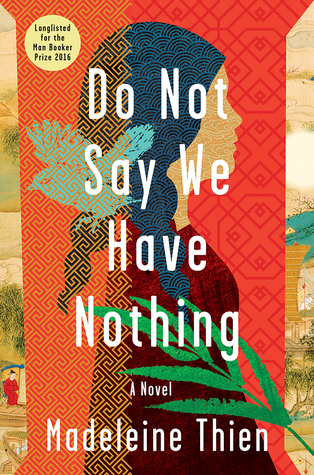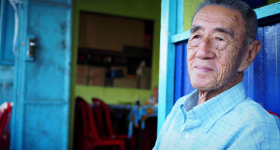We have a confession: we hate "best of" lists. Thousands of books are published every year and to try to whittle those books down to a few "best" seems near impossible. Whether a book is good/important/groundbreaking/heartbreaking or not is subjective, and we recognize that. We recognize it's ridiculous to claim to create a definitive list.
Still, as literature lovers, we can't help but want to highlight some of the books we've read this year that we want to tell everyone about. These novels, short story collections, and poetry collections are books that, for whatever reason, stayed with us long after we finished reading them, books that changed us, or felt important or innovative, or simply were so much fun we want everyone to read them. These particular books published in 2016 are the books we loved, books we're still talking about and recommending to friends and family when they ask us what they should read next. We highlight these books with the awareness that these are personal recommendations, that the list is built upon our personal tastes. In addition to these books, we found many, many other new books written by APIA writers that are worth picking up.
That's where you, the reader, come in: We welcome your additions in the comments section. Tell us what books changed YOU this year and help us make this an evolving conversation filled with APIA book recommendations.
— Karissa Chen, Senior Literature Editor & Eugenia Leigh, Poetry Editor
I like books that make me cry. I'll admit that openly to anyone who asks. I don't think it's because I'm a masochist so much as I believe that art should make you feel something deeply, that it should move and change you, that it should push you to be more compassionate, because somewhere in the story you can find a reflection of yourself. Earlier this year, The Wall Street Journal published a roundup of studies that showed literary fiction, above other genres, made its readers more empathetic, a finding that I think few lovers of literary fiction found surprising. Maybe to me, crying is a marker of a book's success — proving that I had so fully committed to the story and its characters that their lives elicited true emotion in me.
In a year in which there was so much to cry about in real life, this felt even more important. Our world feels so divided these days, so focused on the ways in which we are suspicious of others, on the differences that we might never be able to overcome. Harm continues to be wrought by the powerful on the weak and voiceless. And yet fiction brings us into the psyches all kinds of people, offering them a grace that is often hard to find amidst the senseless violence and tragedy of the real world. It used to be that all the books I read required me to empathize with people completely unlike myself; now, as APIA fiction continues to flourish in all of its diversity, I get to read books where certain cultural, psychological, and historical markers might be familiar to me. More and more, I feel seen as I read fiction, and that offers me hope. Not just because of the many APIA readers who might feel a sense of validation in having their experiences and histories reflected back at them, but also because someone not APIA might read these books and feel moved by them too. Maybe when we read together, we change together. Maybe that's part of how we make this world just a tiny bit better.
I had the privilege of reading a lot of APIA books this year that blew me away in their diversity, quality, imagination, and scope — Alexander Chee's The Queen of the Night, Tony Tulathimutte's Private Citizens, Shawna Yang Ryan's Green Island, Sunil Yapa's Your Heart is a Muscle the Size of a Fist, Peter Ho Davies' The Fortunes — and so many more than I could possibly mention in a limited amount of space. Yet the six books I've chosen to focus on below are all books that made me cry, that I couldn't stop thinking about even weeks or months after finishing their last pages. Either they spoke to my own personal relationship with my identity, or appealed to my broader sense of humanity, or asked me questions that felt pertinent today, given current events. Many of these books did all three for me. I guess what I hope is that more of you will read these remarkable books, that you'll want to pass them on to others, and that we can all change for the better together.
— Karissa Chen
The Story of a Brief Marriage by Anuk Arudpragasam (Flatiron Books)

I had no idea what to expect going into this slim book. The title made me suspect that the story, set during the Sri Lankan Civil War, might not end completely happily, but I could not have been prepared for the jewel that this book was. It isn't a book about a marriage so much as it is about the details of what makes a life, a life. Taking place over a single day, Arudpragasam zooms in on the minutiae of living, despite the threat of death that hangs over its characters. Memorable for me, for example, are the paragraphs in which the protagonist's attempt to, uh, take a dump, are carefully detailed. Nothing is taken for granted in this book, and that's what makes it remarkable. It insists on the preciousness of every thought, action, sensation, and relationship, to a point where a less patient reader might start to wonder "Where is the action?" Yet action in this war-torn setting most certainly leads to death—and it's this awareness, both in the mind of the protagonist and the reader, that allows us to savor the mundanity of this moment lacking in tragic action. While I was reading this book, I couldn't help but think about the horrors in places such as Aleppo, not because the book is a grand sweeping saga of lives in crisis, but because it is the opposite: a book that treats its characters with infinite care and empathy even as they engage in the simplest acts of living.
How I Became a North Korean by Krys Lee (Viking)

I'd be the first to admit that my understanding of North Korea is shaped by America's own fascination with the country, be it through news articles about Kim Jong-Il and son or journalists' own accounts of going behind the country's tightly controlled borders or the first-hand experiences of those who escaped. Still, when it comes to fictions about the country, I can't help but be a bit of a skeptic — the dystopic fantasy of North Korea seems mostly to be speculation, and I often wonder how much of it is fueled by our Western need to imagine ourselves as a superior society. Krys Lee's novel, however, is centered less on North Korea as the looming spectre of a country and more on the humans who must grapple with who they are once they are apart from it. The book, which intertwines the narratives of three young adults — two North Koreans and one Joseonjok immigrant living in America — focuses on the aftermath of escaping North Korea, on the suffering, uncertainty, and sacrifice that is required to move on from fleeing to living. Successfully escaping a place of peril doesn't necessarily mean the peril is over, the book reminds us, and this is the reality for many refugees around the world today. What does it take to be free? How does a person find belonging in a world not meant for nor welcoming of them? In a climate where so many are distrustful of people who come from places they don't understand, Lee's book is important in that it asks us to imagine ourselves in their place, to have compassion for their difficulty and humanity.
The Paper Menagerie and Other Stories by Ken Liu (Saga)

As a kid, I loved speculative fiction. These stories, of course, were largely Western-centric, either commenting through metaphor on American values and history or else referring to Judaeo-Christian, Greek, or Nordic mythology. Of course, as a kid, this was just how I assumed the genre worked. Then this summer I picked up Ken Liu's collection of short stories, which he curated from his oeuvre, and for the first time, I found myself reflected in a genre I hadn't ever consciously thought could reflect me. On the surface level, Liu's collection is dazzling evidence of his versatility and inventiveness: he moves effortlessly between a Calvino-esque story about the bookmaking habits of imaginary species to a dystopic story on the infiltration of Google/Amazon Echo/Facebook-type technology to a Chinese demon story turned steampunk meditation on colonialism and industrialization. The stories are fun, in part because I never knew what kind of story I'd be getting next. Would it be a hard science fiction space travel odyssey? A documentary on time travel? A reimagined history of the Chinese god of war set in Gold Rush America? But what really moved me about the collection was how much the book felt written for me. Liu's work combines Taiwanese, Chinese, Japanese, and American history and culture with its speculative aspects to create metaphors that ask questions about responsibility, memory, and truth. The result is a heartwrenching body of work that isn't easily forgettable. One of my favorite stories, "The Literomancer," involves the young daughter of an American CIA agent and the Communist defector who teaches her to see the magic hidden in Chinese characters amidst the backdrop of 1960s Kuomintang-controlled Taiwan; this particular story has haunted me for months. It probably would have stayed with me even if I wasn't of Taiwanese-Chinese descent, as it asks big questions of evil and fascism that can be applicable universally; still, the fact that it asked these questions by drawing upon all of my histories and cultures meant something to me. It was a story my kid self never could have imagined.
Do Not Say We Have Nothing by Madeleine Thien (W. W. Norton)

At the point when a pivotal, heartbreaking event occurs in Madeleine Thien's Man Booker-nominated novel, I was in a rapidly descending plane towards a Western city. As we taxied towards the gate, I wept silently in my seat, wondering if the many Caucasian faces around me might ever be able to understand why I was so moved by this book. I've read several Cultural Revolution books in my life, but something about Thien's writing made the frenzy and tragedy of the era surprisingly painful in its complexity. Part of it was that the story primarily focused on three classical musicians at the Shanghai Conservatory of Music and, given the current uncertainty of our world, the predicament of artists struggling to find a place to love and live for their art hit close to home. But more than that, Thien's characters posess a bewilderment and beauty at having to adapt in order to survive, and the tragedy and familiarity of it made me ache deeply. The book itself is well-researched and ambitious in scope; it offers a story within a story within a story, a missing girl, a mysterious suicide, mythology and music. It spans three generations and covers the time before the Chinese Civil War all the way to the Tiananmen Square Massacre and beyond. The prose is beautiful, ghostly, and filled with longing. All of these elements combine to form a work about the Cultural Revolution unlike one I've ever read before. It isn't just about how terrible that time was; it isn't even just about how people suffered. It's a book that wants to understand how a person preserves their true self despite the violent forces around them. That feels like a timely question to me, one with no easy answers.
The Border of Paradise by Esmé Weijun Wang (The Unnamed Press)

In the opening section of Wang's book, we meet a white man with mental illness who is about to commit suicide. This isn't a spoiler; he announces his intention in the book's opening lines. But instead of moving immediately to the suicide, we are given his story from childhood, including details of his unnamed illness and the solace he finds in his first love. The writing is lyrical and the narrative intriguing, although for the most part seemingly standard realist fiction. And yet, halfway through the next section — that of a Taiwanese woman brought to America — I began to suspect that something deeply disturbing was happening in the novel. Gothic elements began to spring up in the book — large, empty houses, obsessive relationships, an air of darkness and isolation. At first I didn't know what to make of this turn, but Wang's prose was so fresh, so captivating, that I continued to read, pulled deeper and deeper into these characters lives. This is part of the magic of the book, I think — how Wang draws you into the net little by little and eases you into the more disturbing aspects of the book without your notice. I don't want to say too much about the plot, as part of the fun of the book was the surprise of delving into these characters' psyches, but I will say that Wang's story made me think a lot about what happens when mental illness is ignored, when immigrant women are isolated and subject to veiled misogyny, when helplessness morphs into a dark desire to control. Wang's book is one of the more unique books I've read this year, and since I've read it, I haven't stopped trying to wrap my head around the questions it has raised in me.
Shelter by Jung Yun (Picador)

How traumatic is the immigrant experience and how is that trauma passed down from one generation to the next? These were the questions I found myself thinking about while reading Shelter. Jung Yun's novel is primarily about trauma, after all — it opens with the horrifying reveal that the protagonist's aging mother has been brutalized by home invaders. While other books might center around the attempts to find the perpetrators, for Yun's book, this is just the framework in which her characters must learn to confront the histories that they've tried to ignore. Kyung, the protagonist, is a man who hasn't forgiven his father for his past abuse nor his mother for her complacency, and yet he still feels the need to fulfill his filial duties by bringing his parents to live under his roof after the attack. The book explores this tension between being an independent American and the responsibilities as an Asian son and the pressures and helplessness that immigrants experience when trying to make a place for themselves. More than any other book I'd read this year, this book captured a psychological mindset that felt extremely familiar to me, something I was grateful to see appear on the page. At some points, many of the characters are straight-up unlikable, and yet I found I could always understand them, if not forgive them. At the end of the book I found myself startled by how moved I was — the last few pages offered unexpected grace. And maybe that's what the book is asking of us. Not to bestow absolution on the characters, because some actions are unforgivable, but to pull back and understand how entire immigrant families can become victims to trauma and how these wounds can cut deeper than we might suspect.
Check out Poetry Editor Eugenia Leigh's 2016 Poetry Picks here.










Comments